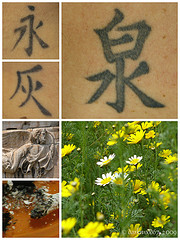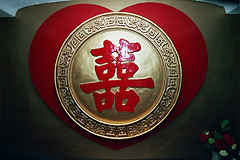by Manuel Marino | History

Photo by darkwood67
The Kanji script is now more closely associated with the nation of Japan rather than China, despite its origins in China. The modern Japanese logographic writing system was developed with the help of Chinese characters, which were adopted into the Japanese system. The term “kanji” refers to Han characters of Chinese origin.
So, what is the true story behind Chinese kanji symbols and how did they become credited to Japan? It all began when Chinese articles started to enter Japan as imports, bearing inscriptions of Han characters.
One example of such an article is the gold seal that was presented to the Japanese emperor by the Han dynasty. The exact details of how and when the Japanese began to incorporate the use of Chinese characters remain a mystery.
It is highly likely that the Chinese themselves introduced the Chinese Kanji script to Japan when some of them migrated there. There was no way for the Japanese to have had the opportunity to learn and discover the script on their own.
Over time, China and Japan developed friendly relations in trade and other areas, resulting in the exchange of documents between the two countries. In such circumstances, it … ...Read the rest.
“Asian Kanji Symbolism”
by Manuel Marino | Culture, Writings

Photo by londonista_londonist
There are approximately eighty thousand Chinese symbols or more, encompassing characters, alphabets, and signs that have been used in China for thousands of years. However, the usage of these symbols has become more limited in recent times.
As the Chinese language has evolved over time, the use of symbols has declined. Nevertheless, these symbols serve another purpose connected to the arts. The physical form of the ancient Chinese symbols possesses a timeless artistic appeal that has garnered worldwide fame.
When we observe China itself, we can see the presence of Chinese symbols in various aspects of life. The cityscape is adorned with Chinese symbols depicted through different mediums of art and architecture. Nowadays, it is common to find Chinese symbols on everyday products such as kitchenware. Many people still use traditional Chinese symbols for superstitious reasons rooted in Chinese culture.
The construction of Chinese symbols is carried out in such an artistic way that they appear visually appealing regardless of their meaning. However, each Chinese symbol holds a deep and profound meaning along with its traditional usage and historical significance.
When discussing Chinese symbols, it is important to note that they cover a wide range of meanings, … ...Read the rest.
“The Truth And Beliefs About Chinese Symbols”
by Manuel Marino | Culture

If you are up to date on the global economy, you’ll recognize that China has the fastest-growing economy in the world. In fact, the Chinese language has become so prominent in business that the demand for learning Chinese has more than tripled in the past decade. Additionally, if you look at the courses offered in major and secondary schools, you’ll see Chinese language courses being offered.
Consider that half of Asia already speaks some form of Chinese or incorporates elements of Chinese into their native languages.
Why should you learn Chinese? Because the world today needs it. With the growing appreciation for Chinese culture, such as martial arts, media (who can forget Jackie Chan?), and Chinese cuisine, inspirations have emerged from Eastern ways of life, sparking a call to learn Chinese.
The Chinese culture itself represents harmony, peace, and serenity, contrasting with the fast-paced, time-driven business life of the Western world.
Learning Chinese, whether it’s the arts, language, or cultural practices, can provide tools to enrich your daily life and restore balance. The influence of Chinese culture is undeniable.
Why learn Chinese? Because you genuinely want to. You have the focus and determination to immerse yourself in cultural understanding. Perhaps … ...Read the rest.
“Would You Learn Chinese?”


 Manuel is a passionate, driven, and techsavvy AV technician,
Manuel is a passionate, driven, and techsavvy AV technician, 



Recent Comments